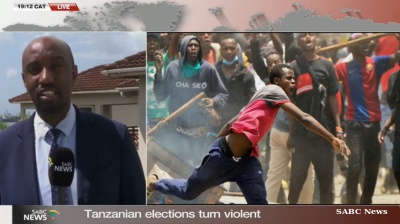Several members of the East African Legislative Assembly (EALA) have spoken in favour of a controversial oil pipeline planned in Uganda and Tanzania, arguing that the EU had no standing to call for the suspension of a project that is not being carried out on European territory.
Speaking during an EALA session in Kigali, Manasseh Nshuti, Rwanda’s Minister of State in charge of East African Community (EAC) affairs, spoke critically about the European Parliament’s adoption in September of an emergency resolution condemning the East Africa Crude Oil Pipeline (EACOP) and related projects. He stressed that Uganda and Tanzania, which had agreed to host EACOP, were both sovereign states.
“When you talk about [the] European Parliament, it is as if we owe our lives to them. I don’t think we do,” he was quoted as saying by The East African.
He also suggested that Africa find a better method of communicating its own positions to EU institutions, saying: “We need to have a stronger say, maybe continentally, to work in co-ordination.”
Suzan Nakuwuki, an EALA member from Uganda, also stressed the sovereignty of the countries taking part in EACOP but struck a more confrontational note. “The EU parliament is over-legislating,” she said. “What they should do is go back [the] to EU and focus on the [issues] that affect the people of the European Union.”
Meanwhile, George Odongo, an EALA member from South Sudan, argued that the EU’s desire to shelve EACOP had the potential to deprive Uganda and Tanzania of the opportunity to develop a new revenue stream that would support economic growth. “What this criticism of the pipeline essentially means is that we should maintain the status quo so that those who are already producing continue to produce and the rest of us who are poor but have the resources continue to remain poor,” he commented.
Habib Mnyaa, an EALA member from Tanzania, also stressed that the EACOP host nations were trying to shed their reliance on foreign aid and stated that both host states would seek to reduce the emissions intensity of the pipeline project via carbon capture and use solutions (CCUS).
“We are always trying to find means to be independent, not dependent,” he said. “In many accounts, we see that we rely on donor funding. Carbon dioxide today in this modern world is used in many things, including processing fertilisers.”
The EALA members were speaking shortly after the kick-off of the COP27 international climate summit in Sharm El Sheikh, Egypt. The UN-sponsored event has drawn attention to EACOP and the Lake Albert Development Project (LADP), which envisions the development of the Ugandan oilfields that will be used to fill the 1,443-km pipeline.
Ugandan Energy Minister Ruth Nankabirwa said last week that Kampala expects those fields to start production in April 2025. She also indicated that Tanzanian President Samia Suluhu Hassan was expected to visit China in the near future to discuss options for funding the $4bn EACOP project.
News

Serbian police arrest dozens during clashes outside parliament
The confrontation erupted when anti-government protesters faced off with ruling party supporters camping opposite the parliament building.

Iran-US ties impossible, Supreme Leader Khamenei declares
Iran's Supreme Leader Ayatollah Ali Khamenei rules out cooperation with United States unless Washington withdraws regional military presence and support for Israel, speaking ahead of 1979 embassy takeover anniversary.

Moldova’s new government sworn in with goal to sign EU accession treaty by 2028
With a fragile majority in the parliament, the new cabinet has pledged to prioritise EU accession and economic development.

Northern Afghanistan hit by M6.3 tremor
A powerful earthquake has struck northern Afghanistan, leaving at least four people dead and scores injured, according to local officials. The numbers are expected to rise significantly.




